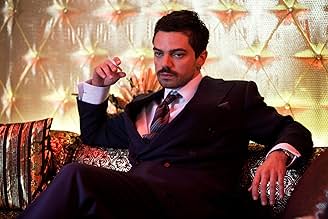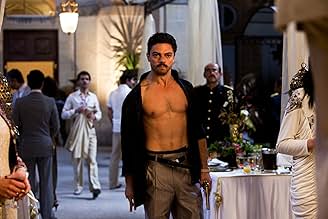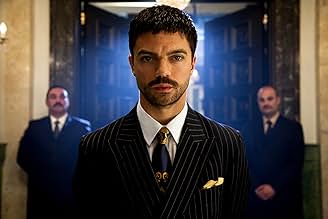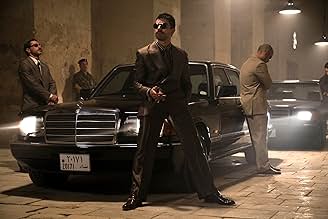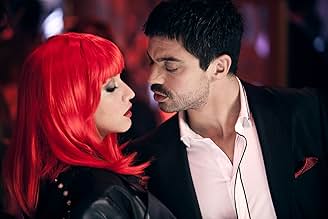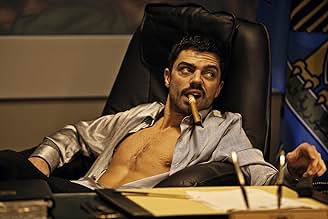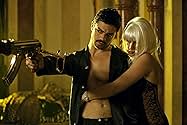C'est l'histoire vraie et choquante d'un homme ordinaire dont la vie est bouleversée lorsqu'il est contraint de devenir le sosie du redouté "Prince Noir".C'est l'histoire vraie et choquante d'un homme ordinaire dont la vie est bouleversée lorsqu'il est contraint de devenir le sosie du redouté "Prince Noir".C'est l'histoire vraie et choquante d'un homme ordinaire dont la vie est bouleversée lorsqu'il est contraint de devenir le sosie du redouté "Prince Noir".
- Director
- Writers
- Stars
- Prix
- 4 nominations au total
- Ali
- (as Mimoun Oaissa)
- School Girl
- (as Amrita Acaria)
- Amer
- (as Sarah Lee Zammit)
Avis en vedette
The depiction of Uday's psychotic character throughout the movie seems very real and does not spare or cheat the viewers any disturbing torture/abuse scenes. Some people might dislike this, some maybe even enjoy it.
That being said I liked the overall acting, both main and lesser characters did a good job. And on a side note: i found the movie sets and props were quite awesome.
btw: I can still remember the news of Uday's and Qusai's deaths back in 2003, but that meant little to me at that time. At least now i know.
8.5/10 Stars****
According to the film maker, what we saw was in more respects not completely accurate. Some freedom was exercised while portraying the situation in Baghdad at that time. The existence of stand-in's, however, was realistic and publicly known. That went as far as showing them openly, if only to confuse potential attackers. It certainly reduced the risk in public appearances, since one could never know whether you saw the real one, or a double dressed and acting like the real one.
There were also questions about using English as the prime language. The producer had some arguments in favor of the choices made. Firstly, raising a 50M budget for a movie with Arabic speaking actors, was considered a Mission Impossible. Also, English is generally accepted as the standard movie language, spoken by Roman emperors as well as aliens from other planets.
The Q&A also revealed some facts about how Dominic Cooper handled his double role. We now know that he played both roles on the same day, given the entourage and colleague actors present that day. He always played the "lunatic" parts first, and (without much time in between) the "Latif" parts shortly after that. Of course, there was a challenge in keeping track of the places where the counterpart actor stood at particular moments during the scene. Anyway, if he missed a few and looked in a wrong direction at some instances, I did not notice it and I think the same of other people seeing this film for the first time.
At various moments throughout the screening the notion crossed my mind that this movie could be construed as a justification of overturning the Sadam regime, or (in other words) as propaganda in favor of George W for a completed project in Iraq. In retrospect, I don't think such a hidden meaning was intended. The film was not against Sadam as a dictator in particular, but rather against dictators in general. They existed and ruled since the time of the Roman emperors (and probably before that), and still are ruling nowadays in countries all over the world. We see the wrong side effects of unlimited power. We also see how uncooperative people were regarded "that is the thanks we get for uplifting this country" (or variations thereof).
Political issues and hidden meanings set aside, we saw a well constructed story line, believable casting, and an inside view in the palace and its inhabitants at that time. One can argue about the torture, punishment and other violent scenes, that these better could be left out, or otherwise included implicitly by telling about it (without showing actual pictures). On the other hand, leaving these out would change the film too much into a costume drama, thereby reducing the impact it now will have on the average viewer. Anyway, it is easy for us to criticize choices being made by the film makers. In my opinion they did their job very well, all things considered.
The reality of Latif's life was that he became so entrenched in Uday's character that he practically became him. He became violent and even after he escaped with his wife and kids (not with a hooker on a horse) he continued to behave like Uday.
The acting was not great. The portrayal of Uday was over the top and not believable. Same with the constant backchat from Latif to Uday considering that an out of line comment is the reason Latif ended up getting shot in reality.
The film could have been an intelligent psychological drama instead of a dumbed blockbuster. Shame.
But there is a serious drawback when someone watches this movie knowing that at the time of movie release in 2011, the main character and the author, Latif Yahia, was (and still is) glorifying the tyrant and calling on people to re-establish his era in Iraq. He actually has a YouTube channel filled with his political opinions and his shameless strange sympathy to the tyrant!! So whatever the author's claims about his political views, or about his own opinions of not having political views; he was not opposing the tyrant, and still not; he was one of the tyrant's followers and still is.
Now watching the movie knowing that the writer and main character stands there, it will make the audience uncomfortable and cautious to accept what's being told in this movie without questioning.
Aside from that, directing was weak in general, and the story is not as the original Arabic book (I Was A Son For The President), but a revised version of the English edition which was a revised version of the Arabic edition!
For example in the Arabic edition the main character was claimed to be a ranked army officer, in the movie he was just a soldier. In the original story it was claimed that the tyrant saw and examined his son's double for a few times, in the movie that wasn't happening. Now if this was a history book/movie then.. voila! There is a good definition for the person who says what he doesn't think and thinks what he doesn't say, and changes his saying/thoughts 3 times in a day...
Le saviez-vous
- AnecdotesThere is a reference to The Godfather in one of the first scenes where Latif is impersonating Uday. He acts as a double when entering and leaving an important meeting. When he leaves and is shot at by a young boy an orange cart is shown prominently with oranges falling. Oranges were present whenever death occurred or was about to in The Godfather and there was an orange cart featured when Don Corleone was shot at it.
- GaffesIn a lot of car scenes the driver is on the right side, but in Iraq the driver seat is on the left.
- Citations
Munem: Please be clear about this, Latif. Uday has chosen you. You belong to him. You have about five minutes to think about this. Before a car pulls up outside your house in Al-Adhamiya and your family, everyone one of them - your father, your mother, your sisters and brothers; is thrown into Abu Ghraib. God willing, they will die quickly. I've said too much. You have about two minutes left.
- ConnexionsFeatured in Breakfast: Episode dated 10 August 2011 (2011)
- Bandes originalesYou Spin Me Round (Like A Record)
Written by Pete Burns (as Peter Jozzepi Burns), Steve Coy(as Stephen Coy), Mike Percy (as Michael David Percy), Tim Lever (as Timothy John Lever)
Performed by Dead or Alive
Courtesy of Sony Music Entertainment UK Ltd
Published by Burning Music Ltd (PRS), Westbury Music Ltd
All rights on behalf of Burning Music Ltd
Administered by Warner/Chappell Ltd
All Rights Reserved
Meilleurs choix
- How long is The Devil's Double?Propulsé par Alexa
Détails
- Date de sortie
- Pays d’origine
- Sites officiels
- Langue
- Aussi connu sous le nom de
- The Devil's Double
- Lieux de tournage
- sociétés de production
- Consultez plus de crédits d'entreprise sur IMDbPro
Box-office
- Budget
- 19 100 000 $ US (estimation)
- Brut – États-Unis et Canada
- 1 361 512 $ US
- Fin de semaine d'ouverture – États-Unis et Canada
- 96 414 $ US
- 31 juill. 2011
- Brut – à l'échelle mondiale
- 5 728 213 $ US
- Durée1 heure 49 minutes
- Couleur
- Mixage
- Rapport de forme
- 2.35 : 1
Contribuer à cette page






